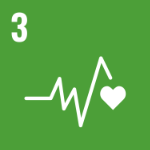

3. Good health and well-being

8. Decent work and economic growth

16. Peace, justice and strong institutions
Leadership Observatory Report 2020
Today's organizations are confronted with ever-growing challenges in a progressively complex ecosystem where multiple stakeholders battle for their time and resources. These challenges become salient as organizational tensions that need to be dealt with by managers and leaders. This report intends to explore the challenges that leaders in Portugal are confronted with and how they deal with them. It is based on 25 interviews conducted throughout 2019 with prominent leaders working in Portugal, as they reflected on four big topics of their personal and professional lives: business & society challenges, talent management challenges, digital challenges, and work-life balance challenges.
The Leadership Observatory Report report starts by introducing the reader to the concept of organizational tensions, meaning the stress, anxiety, or discomfort they feel when they need to make choices that ultimately move their organizations forward. A distinction is drawn between different kinds of organizational tensions, namely dilemmas, dialectics, and paradoxes.
After introducing the topic of organizational tensions, we focus on leadership and leaders' role in dealing with these tensions. We highlight the well-studied advantages of behavioral complexity and self-leadership, and we also explore how leaders can use "both/and", in detriment of "either/or" thinking, to construct temporary workable certainties in a dynamic equilibrium that propels their success.
The report then resumes by examining leader's noteworthy statements on the four previously mentioned topics:
• In the business & society challenges' section, we examine the strategies some of the interviewed leaders use to deal with change, how they need to be fast but also calm in their reactions, and how they frame change in positive, generative ways. We report on how they deal with issues of performance and progress, seeking to remain profitable and growing businesses, but increasingly need to ensure they remain environmentally sustainable and socially conscious. Finally, we explore how agency issues affect their organizational identities and how family businesses, in particular, adjusting to competing demands and a mismatch of long- and short-term objectives.
• In the talent management challenges' section, we address talent development issues and how important it is to leave the comfort zone to grow. We reflect on the importance of education for the interviewees, even as this becomes a riskier and riskier bet. We interpret the challenges of self-assessed generational differences between the current leaders and the newer millennial and gen-Z employees and future leaders, as both groups seek to impact society. We look at the necessary skills to become an effective leader and the characteristics that organizations look for when building up their second lines of leaders as they prepare for the future. Finally, we examine the advantages and difficulties of fostering diverse teams and how promoting diversity may stimulate creativity and innovation but is also becoming a significant headache for leaders.
• In the digital challenges' section, we analyze the digital paradigm shift that took over the leadership role. We look at how the role of technology is changing the landscape of work and organizations. We explore how leaders are seeking to utilize this change to the advantage of their organizations. Finally, we look at how organizations might need to become momentarily slow to become fast in the future, and we discuss the consequences of the analog-to-digital transformation.
• Lastly, we have a chapter on the challenges of work-life balance. This chapter discusses how leaders find comfort in being uncomfortable and what emotional mechanisms they use to reframe what is work and what is a hobby. We discuss the importance of knowing how to delegate and how this is also a way of attaining some control. Finally, we analyze how an overload of human interaction and the lack of personal time can paradoxically make the leaders feel progressively isolated.
• As a last note, it should be made clear that the interviews that originated this report took place in 2019, before the 2020 pandemic crisis of COVID-19. Because of this, and while the suggestions for action remain, we believe, useful and pertinent, they do not take into account the massive changes that are taking place as we publish this report. If anything, it is our belief that some of the tensions we explored in this report are being made salient by the present crisis. If there was ever a time for leaders to explore the benefits (but also the challenges) of a paradoxical operational mode and mindset, that time is now.

